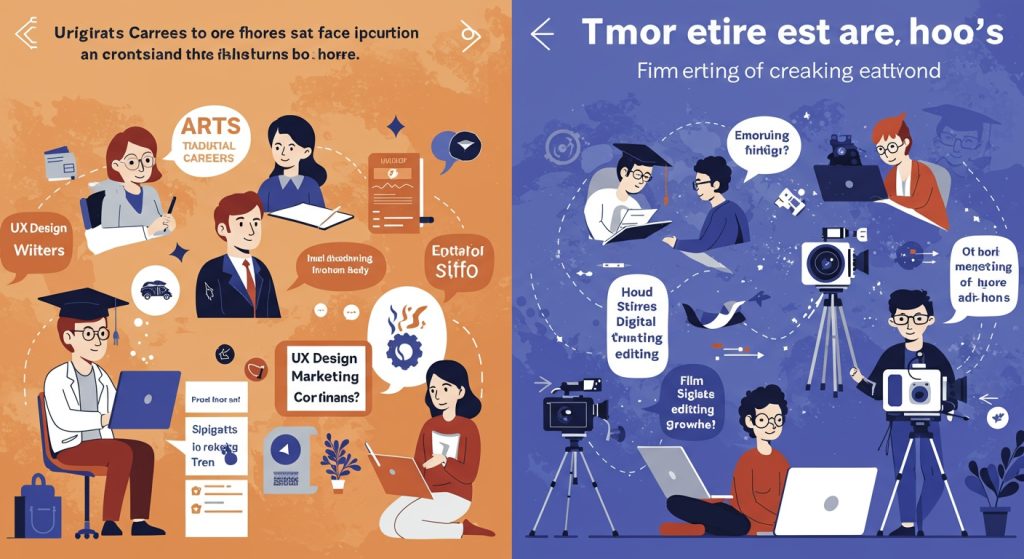Graduating opens doors, yet the modern job market presents unprecedented hurdles. Navigating Applicant Tracking Systems (ATS) to avoid digital black holes, combating the widespread “ghosting” phenomenon. Standing out amidst a global talent pool amplified by remote work options demand more than a strong GPA. Today’s successful candidates strategically leverage AI tools for resume optimization, master virtual networking platforms like LinkedIn. Articulate quantifiable achievements, not just responsibilities, to resonate with hiring managers. The degree signifies potential; demonstrating direct applicability, especially in an era valuing adaptive skills and continuous learning, truly secures the coveted offer. Mastering this complex landscape redefines post-graduation success.

The Reality Check: Understanding the Post-Grad Landscape
Stepping out of university with a freshly minted degree feels like the culmination of years of hard work, a golden ticket to your dream career. But, for many new graduates, the immediate post-graduation period often comes with a surprising reality check: the job market isn’t always as straightforward as career fairs made it seem. The transition from academic life to professional employment presents a unique set of hurdles that can feel daunting.
One of the most common challenges is the inherent paradox of “experience.” Many entry-level positions demand prior experience, yet how does one gain experience without first securing a job? This is a fundamental barrier. Beyond this, new graduates often face:
- Intense Competition: You’re not just competing with your classmates. With graduates from previous years, career changers. Even more experienced professionals vying for similar roles.
- Skill Gaps: While your degree provides foundational knowledge, the specific technical or soft skills required by employers might not have been fully covered in your curriculum. This often includes proficiency in industry-standard software, advanced data analysis, or even nuanced communication skills.
- Lack of Network: Established professionals have years of contacts. New graduates often start with a limited professional network, which is a significant disadvantage in a job market where many opportunities are found through connections.
- Unrealistic Expectations: Sometimes, the ideal job portrayed during studies doesn’t align with the available entry-level roles, leading to disillusionment.
Understanding these challenges is the first step towards effectively conquering them. It’s about shifting your mindset from expecting a direct path to actively navigating a complex landscape.
Bridging the Experience Gap: Strategies for New Grads
The “experience required” dilemma is perhaps the most frustrating aspect for new graduates. But, experience isn’t solely defined by full-time, paid employment. It encompasses any activity where you’ve applied skills, solved problems. Contributed to a tangible outcome. Here’s how to build and leverage “experience”:
- Leverage Internships (Past and Present): If you completed internships during your studies, meticulously document your responsibilities, achievements. The skills you utilized. If you haven’t, consider pursuing post-graduate internships, even if they are unpaid initially, as they offer invaluable real-world exposure and networking opportunities.
- Volunteer Work and Community Engagement: Volunteering for non-profits, community projects, or even organizing events can provide practical experience in project management, teamwork, communication. Leadership. For instance, managing social media for a local charity demonstrates digital marketing and content creation skills.
- Freelancing and Gig Work: Platforms like Upwork, Fiverr, or even local community boards offer opportunities for short-term projects. This not only builds a portfolio but also showcases initiative, time management. Client interaction skills. A graphic design graduate might take on small logo projects, while a writer could offer content creation services.
- Personal Projects and Portfolios: This is especially crucial for fields like design, software development, writing. Multimedia. Create your own projects that demonstrate your skills. A computer science graduate could build a small web application; a marketing major could develop a mock campaign for a real company. These projects speak volumes about your capabilities and passion.
- Highlight Transferable Skills: Every activity you’ve undertaken, from group projects in university to part-time jobs, has equipped you with transferable skills. These are universal abilities applicable across various roles and industries. Examples include problem-solving, critical thinking, adaptability, communication, teamwork, time management. Leadership. When describing your experiences, frame them in terms of these valuable skills. For example, “Successfully managed a team of five for a semester-long research project, delivering a comprehensive report on time and under budget” highlights leadership, project management. Time management.
As career coach Dr. Sarah Miller often advises, “Your degree is your foundation. Your experiences, no matter how small, are the bricks that build your professional house.” Focus on articulating how these diverse experiences have prepared you for the professional world.
Mastering the Digital Hunt: Tools and Techniques
Today’s job search is overwhelmingly digital. Navigating online platforms effectively is paramount. Understanding how recruiters find candidates and how Applicant Tracking Systems (ATS) work can significantly boost your visibility.
- Optimizing LinkedIn Profiles: LinkedIn is more than just an online resume; it’s a professional networking hub. Your profile should be complete, professional. Keyword-rich.
- Headline: Beyond your degree, use keywords that describe your aspirations and skills (e. G. , “Aspiring Data Analyst | Python & SQL Enthusiast | Solving Business Problems with Data”).
- Summary/About Section: Tell your professional story, highlighting your unique value proposition, skills. Career goals.
- Experience Section: Use action verbs and quantify achievements where possible.
- Skills & Endorsements: List relevant skills and seek endorsements from peers and mentors.
- Activity: Engage with content, share insights. Connect with professionals in your target industry.
- Effective Use of Job Boards: While broad platforms like Indeed, Glassdoor. LinkedIn Jobs are essential, don’t overlook niche job boards specific to your industry (e. G. , Idealist for non-profits, Dice for tech roles, Behance for creative fields). Set up job alerts with specific keywords to get notified of new openings.
- Understanding Applicant Tracking Systems (ATS): Most large companies use ATS to screen resumes before a human ever sees them. These systems scan for keywords, formatting. Specific data.
- ATS Explanation: An ATS is software that automates the recruitment process. It parses resumes, extracts data. Ranks candidates based on how well their resume matches the job description’s keywords and criteria.
- How to Beat Them:
- Keyword Optimization: Mirror the language used in the job description. If the job description says “customer relationship management,” use that exact phrase instead of “client handling.”
- Clean Formatting: Use standard fonts, clear headings. Avoid complex graphics, tables, or text boxes that an ATS might struggle to read.
- Standard Headings: Use common headings like “Experience,” “Education,” “Skills.”
- Resume File Type: Often, PDF is preferred as it maintains formatting. Some ATS systems prefer Word documents (. Docx). Check the job application instructions.
Here’s an example of how keyword optimization might look for a data analyst role:
Desired Keywords from Job Description: - Data Analysis, Statistical Modeling, Machine Learning - Python, R, SQL - Data Visualization (Tableau, Power BI) - Problem-Solving, Communication Resume Section (Skills or Experience Bullet Points): - Proficient in Data Analysis and Statistical Modeling using Python and R. - Developed Machine Learning models for predictive insights. - Created interactive Data Visualization dashboards in Tableau and Power BI. - Applied strong Problem-Solving skills to complex datasets, presenting findings with clear Communication. - Personal Branding Online: Beyond your professional profiles, be mindful of your overall online presence. A personal website, blog, or professional social media accounts (e. G. , GitHub for developers, Instagram for designers) can serve as powerful tools to showcase your skills, thought leadership. Personality. Ensure any public-facing content aligns with your professional aspirations.
The Power of Connection: Networking in the Modern Age
Networking is consistently cited by career experts as one of the most effective job search strategies. It’s not just about getting a job; it’s about building relationships, gaining insights. Discovering opportunities that might not be publicly advertised.
- Why Networking is Crucial:
- Hidden Job Market: A significant percentage of jobs are filled through referrals or internal hiring before ever being advertised.
- Informational Interviews: These are conversations with people in roles or companies you’re interested in. They provide invaluable insights into industries, companies. Roles, helping you refine your career path.
- Mentorship and Support: A strong network can provide guidance, advice. Emotional support during your job search and throughout your career.
- Credibility and Referrals: A personal referral from an employee often carries more weight than a cold application.
- Online Networking:
- LinkedIn: Connect with alumni, industry leaders. Recruiters. Send personalized connection requests explaining why you want to connect (e. G. , “I admire your work in X field and would love to learn from your experience”). Participate in relevant groups, comment on posts. Share valuable content.
- Professional Forums & Communities: Join online communities related to your field (e. G. , Stack Overflow for developers, specific Reddit communities, industry-specific forums). Engage constructively, answer questions if you can. Ask thoughtful questions.
- Virtual Events: Attend online webinars, conferences. Career fairs. Many platforms allow for direct messaging or breakout rooms for virtual networking.
- Offline Networking:
- University Alumni Networks: Your university’s alumni association is a powerful, often underutilized, resource. Alumni are often eager to help fellow graduates.
- Career Fairs & Industry Events: Even if you don’t find a direct job lead, these events are excellent for meeting recruiters and industry professionals face-to-face. Prepare an “elevator pitch” about who you are and what you’re looking for.
- Informational Interviews: Reach out to individuals working in your target roles or companies for a brief chat. The goal is to gather details, not to ask for a job directly. If the conversation goes well, they might offer to keep you in mind or refer you.
- Tips for Effective Outreach:
- Be Specific and Respectful: Clearly state your purpose for connecting. Be mindful of their time.
- Do Your Homework: Research the person and their company before reaching out.
- Follow Up: Always send a thank-you note or email after a networking interaction.
- Give Before You Get: Offer value where you can, whether it’s sharing an interesting article or offering a perspective.
Real-world Example: Sarah, a recent marketing graduate, struggled to land her first role despite strong grades. She started reaching out to alumni on LinkedIn for “informational interviews.” One alumnus, an SEO specialist, shared insights into the industry and, impressed by Sarah’s proactive approach, connected her with a colleague who was looking for a junior analyst. This direct referral led to an interview and ultimately, her first job, bypassing the public application process entirely.
Crafting Your Story: Resumes, Cover Letters. Interviews that Impress
Once you’ve identified opportunities, your application materials and interview performance are your chance to tell your unique story and prove your fit.
- Tailoring Resumes and Cover Letters: Generic applications rarely succeed. Each resume and cover letter should be customized for the specific job description. Highlight skills and experiences that directly align with the requirements listed in the job posting. Use keywords from the job description naturally throughout your documents.
- The STAR Method for Interviews: For behavioral interview questions (e. G. , “Tell me about a time you faced a challenge”), use the STAR method to structure your answers:
- S – Situation: Briefly describe the context or background.
- T – Task: Explain the specific task or challenge you faced.
- A – Action: Detail the specific actions you took to address the task or challenge.
- R – Result: Describe the positive outcome of your actions, quantifying results whenever possible.
For example, if asked about a time you worked in a team: “S: During my senior project, our team was struggling to meet a critical deadline. T: My task was to reorganize our workflow and re-assign responsibilities. A: I initiated daily stand-up meetings, created a shared task tracker. Volunteered to take on an additional research component. R: As a result, we not only met the deadline but delivered a project that received an ‘A’ grade. Our team cohesion significantly improved.”
- Behavioral vs. Technical Interviews:
- Behavioral Interviews: Focus on your past behavior to predict future performance. Questions often start with “Tell me about a time when…” or “Give me an example of…”. The STAR method is perfect here.
- Technical Interviews: Common in STEM fields, these assess your specific technical skills and problem-solving abilities. They might involve coding challenges, system design questions, or in-depth discussions about your knowledge in a specific domain. Practice coding platforms (e. G. , LeetCode), review fundamental concepts. Articulate your thought process clearly.
- Follow-Up Strategies: Always send a thank-you email within 24 hours of an interview. Reiterate your interest in the role, thank them for their time. Briefly mention something specific from your conversation to make it personal. For example, “It was great learning about your team’s innovative approach to [specific project discussed].”
Here’s a quick comparison of common interview mistakes versus best practices:
| Common Interview Mistakes | Best Practices |
|---|---|
| Failing to research the company/role. | Thoroughly research the company’s mission, values, recent news. The specific job requirements. |
| Vague or rambling answers. | Use structured responses like the STAR method; be concise and to the point. |
| Not asking questions. | Prepare thoughtful questions about the role, team, company culture. Next steps. |
| Focusing only on what you want. | Articulate how your skills and experiences will benefit the company and the role. |
| Poor body language (e. G. , slouching, avoiding eye contact). | Maintain good posture, make eye contact, smile. Convey enthusiasm. |
Navigating Setbacks: Resilience and Continuous Learning
The job search can be a marathon, not a sprint. Setbacks are almost inevitable. It’s crucial to cultivate resilience and commit to continuous growth.
- Dealing with Rejection: Rejection is a normal part of the process. It’s rarely personal and often reflects factors beyond your control (e. G. , internal hire, company restructuring, fierce competition). Allow yourself to feel the disappointment. Then critically assess if there’s a lesson to be learned. Don’t let it undermine your self-worth.
- Importance of Feedback: If possible, ask for feedback after an interview or application rejection. While not always provided, constructive criticism can be invaluable for identifying areas for improvement in your resume, interview skills, or skill set.
- Upskilling and Reskilling: The professional world is constantly evolving. What’s in demand today might be obsolete tomorrow. Identify skills gaps by reviewing job descriptions for roles you desire and invest in acquiring those skills.
- Online Courses: Platforms like Coursera, edX, Udemy. LinkedIn Learning offer certifications and courses in a wide array of subjects, from data science to digital marketing. Many are taught by university professors or industry experts.
- Certifications: Industry-recognized certifications (e. G. , Google Analytics, AWS Certified Cloud Practitioner, Project Management Professional) can validate your expertise and make you more marketable.
- Workshops and Bootcamps: Intensive, short-term programs can quickly equip you with in-demand skills.
- The Role of Career Guidance: Professional Career Guidance can be a game-changer. University career services, independent career coaches, or even mentors from your network can offer tailored advice, resume reviews, mock interviews. Strategic planning. They can help you identify your strengths, clarify your goals. Navigate the complex job market with expert insights. For example, a career advisor might help you realize that your passion for problem-solving aligns perfectly with a business analyst role, even if your degree is in a different field.
- Actionable Steps for Self-Improvement:
- Set aside dedicated time each week for learning and skill development.
- Join professional associations or local meet-up groups related to your desired field.
- Practice interview questions regularly, even with friends or family.
- Maintain a positive outlook and celebrate small victories in your job search journey.
Conclusion
Conquering the post-graduation job search is less about perfection and more about persistent, strategic effort. Remember, your degree is merely a foundation; building upon it requires active engagement with the evolving job market. Instead of passively applying, proactively refine your skills, perhaps delving into AI tools for resume optimization or mastering platforms like LinkedIn for genuine networking, not just connection collection. My own experience taught me that every “no” was simply feedback, refining my approach for the next opportunity. Embrace continuous learning, as seen in the demand for adaptable skills across industries amidst recent shifts towards remote work and automation. Attend virtual industry meetups, engage with thought leaders. Remember that your journey is unique. The right opportunity isn’t just out there; it’s waiting for the person who consistently learns, adapts. Believes in their value. Keep pushing forward; your next big step is within reach.
More Articles
The Future of Learning: Key Trends Shaping Public University Curricula by 2025
Beyond the Classroom: Uncovering Experiential Learning Opportunities at Public Universities
Top Undergraduate Programs: Exploring Popular Courses and Degrees at State Universities
Ensuring Quality Education: Understanding Accreditation and Standards for University Programs
FAQs
I’ve just graduated. The job market feels like a black hole. Where do I even begin with this whole job search thing?
It’s totally normal to feel overwhelmed! The best place to start is with self-reflection. What are your core strengths, what genuinely interests you. What kind of work environment do you thrive in? Once you have a clearer picture, focus on building a strong foundation: a tailored resume, an optimized LinkedIn profile. A clear idea of the types of roles you’re targeting. Break it down into smaller, manageable steps.
How can I stand out when most entry-level jobs demand experience I don’t have?
Don’t underestimate the experience you already possess! Think about academic projects, volunteer work, part-time jobs, club leadership roles, or even personal projects. Highlight the transferable skills you gained – problem-solving, teamwork, communication, project management, data analysis – and connect them directly to the job requirements. Show your eagerness to learn and your strong work ethic. Sometimes, a well-placed internship can also bridge this gap.
Networking sounds intimidating. Any tips for someone who’s not naturally outgoing?
Networking isn’t just about schmoozing; it’s about building genuine connections. Start with people you already know: professors, alumni from your university, family friends, or even former supervisors. LinkedIn is a fantastic tool for low-pressure outreach. Attend online or local industry events focused on learning, not just job hunting. Focus on asking thoughtful questions and being genuinely curious about others’ career paths. You’d be surprised how willing people are to help.
My applications keep getting ignored. Am I doing something wrong with my resume or cover letter?
Chances are, you’re not tailoring them enough! Generic resumes and cover letters rarely catch an employer’s eye. For each application, customize your documents to align with the specific job description. Use keywords from the posting. Quantify your achievements whenever possible (e. G. , ‘managed a project team of 5,’ ‘increased efficiency by 15%’). Proofread meticulously – even a small typo can create a negative impression.
Interviews make me super nervous. What’s the best way to prepare so I don’t freeze up?
Preparation is key to confidence! Research the company thoroughly – their mission, values, recent news. The specific role. Practice answering common interview questions out loud, perhaps even recording yourself. Use the STAR method (Situation, Task, Action, Result) to structure your answers and tell compelling stories about your experiences. Also, prepare thoughtful questions to ask the interviewer; it shows your engagement and interest in the role and company.
I’ve faced so many rejections. It’s starting to feel hopeless. How do I stay motivated?
Rejection is an inevitable part of the job search. It’s not a reflection of your worth. Don’t take it personally. Allow yourself short breaks to recharge, celebrate small wins (like getting an interview!). Maintain a positive outlook. Try to learn from each experience – if possible, ask for feedback. Remember, persistence is crucial. Your efforts will pay off when you find the right fit.
What if I’m not even sure what kind of career I want after all that schooling?
It’s completely normal to feel uncertain about your career path, even after graduation. Don’t feel pressured to have it all figured out immediately. Start by exploring different industries or roles through informational interviews – talk to people in various professions to interpret their day-to-day. Consider short-term projects, internships, or even volunteer roles to test the waters and gain clarity. Sometimes, the best way to find your path is through practical experience.



